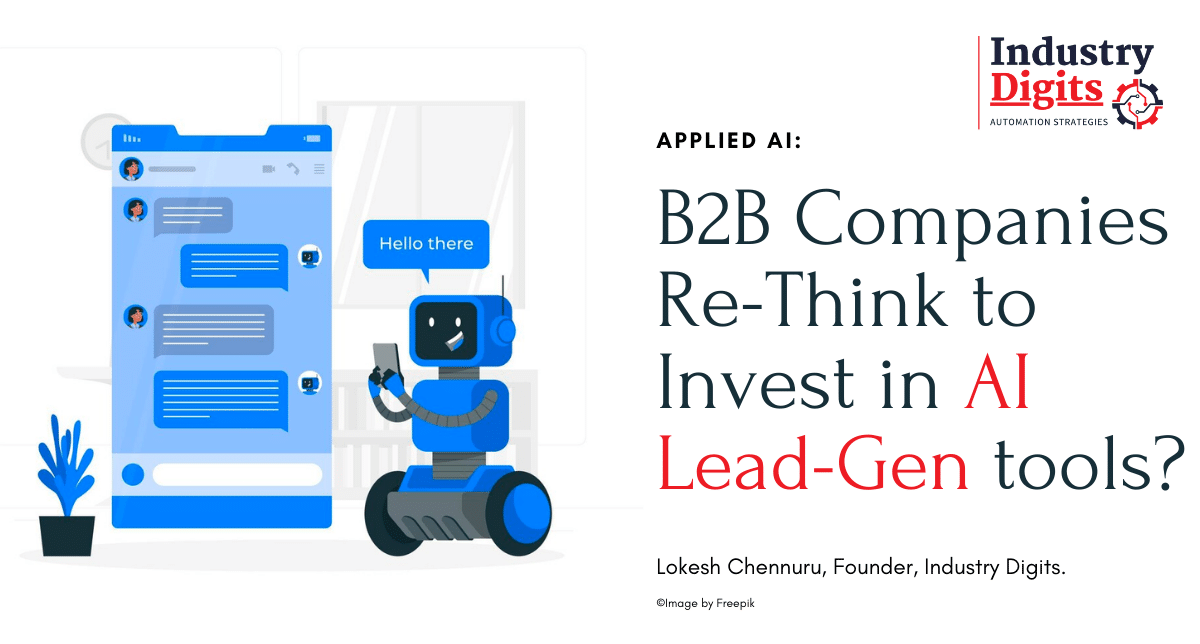Top trends in Growth Systems For B2B you need to know
The Future of B2B: Using AI Automation to Drive Success
The landscape of B2B is moving as companies significantly turn to AI automation for strategic benefit. This change assures to improve performance and client involvement with advanced innovations. The integration of these devices is not without its challenges. Recognizing how businesses can navigate this developing surface will certainly be necessary for future success. What variables will determine the effectiveness of AI in this industry? The answers may redefine typical company versions.
Understanding AI Automation in B2B
As services significantly seek effectiveness, recognizing AI automation in B2B ends up being vital. AI automation describes using man-made knowledge modern technologies to boost and streamline company procedures. In the B2B market, this entails the integration of AI tools to handle jobs such as information evaluation, customer interactions, and supply chain operations. By leveraging device discovering and natural language handling, firms can boost accuracy, reduce human error, and speed up decision-making (Minarik AI). In addition, AI automation facilitates the handling of big quantities of data, allowing services to remove valuable insights and enhance their procedures. As organizations navigate this technological landscape, a detailed grasp of AI automation's capabilities will equip them to remain affordable and receptive to market demands
Secret Advantages of AI Automation for Services
While several organizations grapple with increasing operational needs, AI automation provides countless advantages that can markedly enhance their performance. One substantial benefit is performance; AI systems can execute recurring jobs faster and with higher accuracy than humans, thereby releasing and minimizing errors up employees for more tactical campaigns. Additionally, AI automation allows data-driven decision-making by evaluating vast datasets quickly, providing understandings that notify business strategies. Cost reduction is an additional key benefit, as automation decreases labor expenses and optimizes resource allocation. Moreover, AI can boost scalability, enabling businesses to adjust to market modifications swiftly. Eventually, the assimilation of AI automation cultivates technology, allowing firms to stay competitive in a swiftly developing landscape.
Changing Customer Experiences With AI
AI is improving customer experiences by improving and making it possible for customized communications engagement. Via the implementation of anticipating analytics, organizations can expect client requirements and choices, causing more tailored solutions. Additionally, enhancing support processes with AI modern technology improves effectiveness and complete satisfaction, inevitably changing the overall client trip.
Personalized Communications and Involvement
Personalized interactions have come to be a keystone of effective client involvement in the B2B landscape. By leveraging AI-driven options, businesses can tailor their interaction and offerings to fulfill the unique needs of each client. Automated systems examine client habits, choices, and information, enabling organizations to create customized experiences that resonate with their audience. This level of personalization not only enhances customer complete satisfaction yet additionally cultivates long-term loyalty. Additionally, AI tools promote real-time communications, allowing businesses to react promptly and efficiently to inquiries and feedback. Because of this, companies can construct more powerful connections with customers, making sure that their services align with developing expectations. Inevitably, tailored interaction with AI results in improved outcomes and continual success in the competitive B2B market.
Predictive Analytics Execution
As companies increasingly look for to enhance consumer experiences, executing anticipating analytics has become an essential strategy in the B2B market. By leveraging data-driven insights, companies can anticipate client needs and choices, allowing them to tailor their offerings extra successfully. Anticipating analytics utilizes historic data and advanced algorithms to anticipate future behaviors, enabling organizations to identify possible challenges and chances. This positive strategy not only boosts consumer satisfaction yet likewise cultivates commitment by providing appropriate and prompt solutions. Furthermore, anticipating analytics aids in source allotment, guaranteeing that advertising and marketing initiatives are focused on high-value potential customers. Ultimately, the assimilation of predictive analytics gears up B2B business with the tools necessary to transform client communications and drive lasting success in a significantly affordable landscape.
Streamlining Support Processes
Enhancing customer experiences in the B2B industry prolongs past anticipating analytics; simplifying assistance procedures plays an important function. By integrating AI-driven services, companies can automate regular inquiries and enhance response times, leading to increased consumer fulfillment. Chatbots and virtual aides supply 24/7 support, attending to customer requires without delay and lowering the concern on human representatives. This automation enables teams to focus on complex issues, promoting more meaningful interactions. AI tools can analyze assistance information to identify fads and areas for enhancement, making certain continual improvement of solution high quality. As companies take on these helpful hints modern technologies, they position themselves as customer-centric and receptive, eventually driving loyalty and organization growth in an increasingly affordable landscape.
Improving Procedures and Processes
Enhancing procedures and procedures in B2B atmospheres is essential for boosting general performance. By enhancing operations effectiveness and automating regular tasks, companies can reduce hand-operated errors and liberate useful resources. This shift not just improves efficiency but likewise makes it possible for groups to concentrate on tactical campaigns that drive growth.
Enhancing Operations Efficiency
Enhancing operations efficiency is necessary for businesses looking for to enhance and lower operational costs efficiency. By analyzing existing processes, companies can identify traffic jams and redundancies that prevent performance. Carrying out structured treatments boosts communication and collaboration amongst groups, guaranteeing that jobs are finished more swiftly. Utilizing data-driven insights allows business to make enlightened choices that improve procedures better. Furthermore, taking on incorporated technologies can help with seamless information flow, reducing the threat of hold-ups and mistakes. As organizations welcome these adjustments, they not just cultivate an extra dexterous workplace yet additionally place themselves to react swiftly to market demands - AI Automation For B2B. Ultimately, focusing on workflow performance permits companies to designate resources efficiently, driving long-term success in an increasingly competitive landscape
Automating Regular Jobs
Numerous organizations are increasingly turning to automation to handle regular tasks, recognizing its potential to substantially boost operational efficiency. By releasing AI-driven options, companies can streamline recurring tasks such as data access, invoice processing, and consumer queries. This shift not just decreases human mistake yet likewise liberates beneficial worker time, allowing team to concentrate on value-added jobs and calculated efforts. Additionally, automation can enhance reaction times and solution consistency, bring about improved customer contentment. As companies browse a competitive landscape, leveraging automation for routine jobs ends up being crucial for maintaining and maximizing workflows agility. Inevitably, this method cultivates innovation and drives development, placing organizations for long-lasting success in the advancing B2B environment.
Enhancing Decision-Making With Information Insights

Overcoming Difficulties in AI Execution
Although AI implementation holds the guarantee of considerable functional renovations, companies often face a myriad of difficulties that can hinder progress. Trick barriers consist of information quality issues, as many enterprises struggle with incomplete or inconsistent datasets required for efficient AI training. Furthermore, resistance to change within the workforce can impede the adoption of AI technologies, as employees might be afraid job variation or do not have the essential skills. Budget restrictions also present a difficulty, limiting financial investment in the required framework and skill. Incorporating AI systems with existing procedures can be complex, demanding significant time and sources. Overcoming these obstacles requires a strategic method that consists of thorough training, adjustment administration, and a commitment to continual enhancement in AI initiatives.
Future Fads: The Next Frontier in B2B Automation
While the landscape of B2B automation continues to advance, emerging fads are poised to redefine how organizations run. The combination of innovative expert system will certainly help with extra individualized customer experiences, enabling companies to customize solutions precisely to client demands. The surge of predictive analytics will make it possible for organizations to prepare for market shifts and enhance decision-making procedures. Automation of routine tasks via robotic process automation (RPA) will certainly enhance effectiveness, lowering operational expenses substantially. Furthermore, the fostering of blockchain modern technology promises enhanced openness and security in deals. As these technologies gain traction, companies will progressively utilize AI-driven insights to foster partnership, streamline supply chains, and boost general productivity, marking a transformative change in the B2B landscape.
Often Asked Questions
What Kinds Of Services Can Benefit A Lot Of From AI Automation?
Production, logistics, and customer service businesses can benefit most from AI automation. These markets improve functional performance, lower prices, and improve customer interactions, ultimately leading to increased productivity and success in an open market.
How Can Local Business Carry Out AI Automation Properly?
Small companies can apply AI automation properly by determining repeated tasks, selecting easy to use tools, ensuring adequate training for staff members, and progressively incorporating options to enhance workflows while keeping track of performance and adjusting strategies based upon comments.
What Prevail False Impressions Regarding AI in B2B?
Typical misconceptions concerning AI in B2B consist of the belief that it is just for big business, that it guarantees instantaneous results, which it can fully replace human decision-making instead than increasing it. Growth Systems For B2B.
How Does AI Automation Influence Worker Roles and Work Safety And Security?
AI automation reshapes staff member functions by streamlining repeated tasks, cultivating effectiveness and technology. While some worry work loss, it commonly creates possibilities for upskilling and new settings, ultimately boosting job safety through included value and efficiency.
What Abilities Are Needed to Take Care Of AI Automation Projects?

As businesses progressively look for efficiency, comprehending AI automation in B2B comes to be vital. AI automation facilitates the handling of large quantities of information, enabling companies to remove valuable insights and enhance their procedures. While many companies grapple with boosting functional needs, AI automation presents various advantages that can markedly improve their efficiency. Automation of routine jobs with robotic process automation (RPA) will improve effectiveness, reducing operational costs significantly. Production, logistics, and consumer solution organizations can profit most from AI automation.